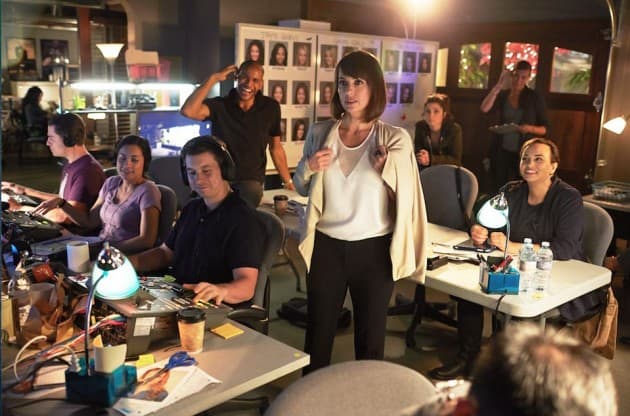
UnREAL is not a show that operates in subtleties; the first image of its main character, reality show producer Rachel Goldberg, sees her crammed in a limo at the feet of women in elaborate gowns, wearing a shirt that says “This Is What A Feminist Looks Like.” But UnREAL is not a show designed to work in subtle ways, nor should it: this is not just a satire on reality television, but a scathing examination of the human cost of producing “great” shows like The Bachelor and the like. It’s as loud with its philosophies as something like The Newsroom, with the trashy, slightly goofy undertones of Nip/Tuck (itself a parody of sorts of reality shows, even becoming one in later seasons) – and while it seems like that blunt attitude would sell it short, it turns out to be UnREAL‘s greatest skill, challenging the viewer by taking its story to the most uncomfortable (if predictable) places. It may not be a blueprint for a lasting series, but as a pilot, UnREAL is a master of its form.
And even though at its core, UnREAL is a condemnation at the human cost of these forced, romanticized series; it has all the tenants of an interesting “inside the industry” drama, akin to another former FX show, the Courteney Cox vehicle Dirt. The surprising humanity UnREAL offers Rachel and some of the contestants on the show-within-a-show (like Faith, the “linebacker in a jump suit” or Mary, the abused single mother) provides avenues with which to build out these characters. Being a satire, many of these women have outlandish traits added to their characters – like Britney, the ‘villain’ who is really an abused orphan. However, these extremes serve a literal purpose, both in adding to the exaggerated atmosphere, and in helping to underline the intricacies in the conflicts between the women on the show and the producers, who are trying to manipulate good television out of their very complex realities.
What’s scary is how even these exaggerated tales in “Return” often center around producers manipulating emotional responses out of the women on Everlasting, the show-within-a-show, trying to define season-long personas and favorites by the first couple minutes they’re seen on screen. Everything is about meeting a dramatic end; getting the abused woman to feel trusted around the ‘bachelor’ (Adam Cromwell, a British playboy trying to hilariously rehabilitate his public image), or preventing the Brazilian model from sleeping with him on the first night. At first, what feels rote and cliche is revealed to be part of the farce; the faux nature of Everlasting, the farce of reality UnREAL itself lives in (with its exaggerated visual bits, like Rachel’s overly unkempt hair), all of this exists in service to accentuate the human cost on both sides of the camera. This is what happens in the machine of fame and reality that ultimately perpetuates men and women – particularly women, as UnREAL makes quite obvious with the office hierarchy, even with the eccentric white male billionaire at the top – demeaning women for the sake of entertainment, an entertainment that pushes these horribly artificial values on human emotions.
All of these ideas, moments,and initial character introductions swirl around the show’s two central points: Rachel, the producer just returning to her job after a mental breakdown that led to multiple felony charges (she stole a car off the set drunk, and presumably trashed it), and Quinn King (played by the talented Constance Zimmer), the executive producer willing to push the show anywhere to “bring in the ratings.” Their dynamic offers the show something a little more beyond its social critique, which is fantastic in the pilot, but will require careful management not to fall into complete absurdity by either repeating itself or becoming too outlandish. The balance in “Return” is remarkable, however; it fills out the past conflict of Rachel with her job and her boss swiftly, and while it unnecessarily complicates things with a former romantic fling working on the same set, the premiere gives the show a strong central pair to return to, for both dramatic and heartwarming moments.
I’m intrigued to see where UnREAL takes this concept; will it move into lighter satirical territory, rehashing the same psychological discussions of the pilot on superficial levels, or dig further into its issues on both sides of the character? There’s a distinct sense of place when we’re with Rachel or Quinn behind the camera, but the women of Everlasting are archetypes at this point, and need to be explored more to become as dynamic as those two. Characters like Faith and the bulimic Anna are interesting ideas, but for UnREAL to maintain its momentum and its uncomfortably real exploration of the emotional cost of reality shows, these women have to feel a little more dimensional. This comes with time, of course – and as the show-within-itself eliminates contestants at what I’d imagine is a rapid pace (the season is only ten episodes long, after all), it will be much easier to define these women as more than “battered old woman,” “slutty hot one,” and “mentally unstable one.” In the pilot, they work wonderfully as ways to force the way we, as an audience, observe and generalize these women (and how producers want us to do this); it’s another thing to make them empathetic presences on their own, and therein lies UnREAL‘s challenge.
What kind of show does UnREAL want to be? Does it want to be truly provocative, or just trashy, ocassionally poignant fun? Is it a show, with a pilot as strong as “Return,” that can operate as both? I don’t have the answer, of course, but these are interesting questions to ask when watching this impressive, confident pilot; after such a fun opening salvo, I can’t wait to find out what it decides to be.
[Photo via Lifetime]
 Follow Us
Follow Us





